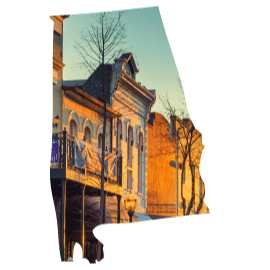Secondary Teacher Preparation in Social
Studies: Alabama
Delivering Well Prepared Teachers Policy
Analysis of Alabama's policies
Secondary social studies teachers in Alabama have the option of a general social studies teaching field license. Coursework must include courses in economics, geography, history and political science and may include coursework in other areas of the social studies. Candidates are required to pass the Praxis II "Social Studies" test. Teachers with this license are not limited to teaching general social studies but rather can teach any of the topical areas.
Middle school social studies teachers have two options: either a comprehensive teaching license with a specialization in general social studies, or one in a single teaching field. Commendably, candidates are also required to pass the Praxis II "Middle School Social Studies" test.
Recommendations for Alabama
Require secondary social studies teachers to pass tests of content knowledge for each social studies discipline they intend to teach.
States that allow general social studies certifications—and only require a general knowledge social studies exam—are not ensuring that their secondary teachers possess adequate subject-specific content knowledge. Alabama's required assessment combines all subject areas (e.g., history, geography, economics) and does not report separate scores for each subject area. Therefore, candidates could answer many—perhaps all—history questions, for example, incorrectly, yet still be licensed to teach history to high school students.
State response to our analysis
Alabama recognized the factual accuracy of this analysis. The state added that it provides a general social studies option at both the middle and the secondary levels to meet the needs of schools that cannot afford to employ a full-time economics or geography teacher, for example, who would carry less than a full teaching load. Program completion requires a "pure" arts and sciences-type major in one area of social studies, which includes a minimum of 32 semester hours of credit with at least 19 semester hours of upper-division credit, in addition to courses in other areas of social studies needed to document compliance with the general rules for all social studies teaching fields and the rules specific to general social studies. Candidates must also pass the Praxis II content test for general social studies.
Alabama also noted that it provides options for the preparation of social studies teachers in the specific disciplines of geography and history and requires candidates to pass the subject-specific Praxis II content test. Program-completion requirements are similar to those stated above.
Last word
Just as with the general science certificate discussed in Goal 1-G, there is no doubt that districts, especially small and/or rural districts, appreciate the flexibility offered by the general science certificate. The state need not do away with this license but rather change its requirements to ensure that a teacher with such a license has the requisite knowledge and skills to teach all included subjects. There are also other ways to address situations where a full-time teacher might not be needed without sacrificing teacher content knowledge, including distance and blended learning or a part-time adjunct license as described in Goal 2-D.
Select another topic
Delivering Well Prepared Teachers
- Admission into Preparation Programs
- Elementary Teacher Preparation
- Elementary Teacher Preparation in Reading Instruction
- Elementary Teacher Preparation in Mathematics
- Middle School Teacher Preparation
- Secondary Teacher Preparation
- Secondary Teacher Preparation in Science
- Secondary Teacher Preparation in Social Studies
- Special Education Teacher Preparation
- Assessing Professional Knowledge
- Student Teaching
- Teacher Preparation Program Accountability
Expanding the Pool of Teachers
Identifying Effective Teachers
- State Data Systems
- Evaluation of Effectiveness
- Frequency of Evaluations
- Tenure
- Licensure Advancement
- Equitable Distribution

